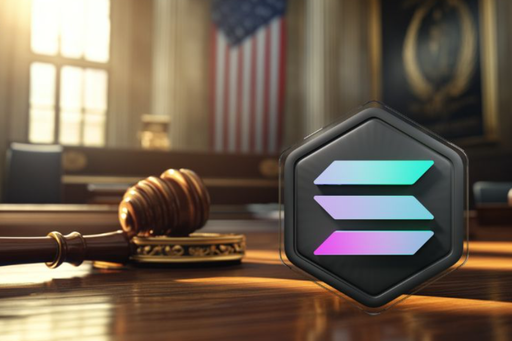
Encouraging Meaningful Delegation Habits - Lisa Tan Weighs in on Governance Apathy on Solana
Speaking with SolanaFloor, Economics Design Founder Lisa Tan argues that stakers should be more involved in network governance.
- Published:
- Edited:
The majority of the cryptocurrency community views staking primarily as a method of generating additional yield on their assets. For better or worse, exercising governance rights and securing blockchain networks like Solana comes second to earning the highest possible APY.
In an exclusive interview with SolanaFloor, Economics Design founder Lisa Tan reflected on some of the challenges facing Solana’s staking ecosystem.
In a world where network participants only care about getting maximum yield, how do we encourage stakers to delegate to validators who share their philosophical values?
Delegator Education
While most network participants simply stake their SOL to a validator in return for rewards, the reality is that this delegation also increases that validator’s stake in the network. Ultimately, network stake translates to voting power, giving larger validators greater influence and control over network governance.
One of the primary challenges is educating delegators on why their participation matters. Many stakers don’t recognize that not all validators will have their best interests at heart. Delegators are so focused on getting the best APY that they often overlook the role validators play in the ecosystem.
“The majority of people, at least a lot of people that I’ve spoken to, everyone cares about the financial gains and it's not because they are greedy. It's not because they just want to be the richest man on earth. It's because everything in our capitalistic society is measured with financial gains and that's not because it's right or wrong, it's purely because it's easy to measure”
Tan believes the solution lies in providing more accessible, data-driven insights into how decisions impact the network. “It’s not just about APY (Annual Percentage Yield); there’s an actual infrastructure you need to care about”
As a potential solution, she suggests more active conversations, forums, and tools for understanding the long-term impacts of governance decisions.
“Having a lot more active conversation of these things, like allowing people to realize that this matters because I think a lot of people don't realize that voting matters. ‘Why do you vote?’ ‘Oh I vote to get the APY or I vote so that I can increase my stake’ but no, you're voting to change the fundamental economic security”
Tan also suggested that AI could potentially be used to make the qualitative aspects of network governance more measurable, which could in turn help delegators make more informed decisions.
“What are the other measurements? Everything we talk about is the quantitative side of things how do we make the qualitative side of things seen as well?”
If validators stakes clearer and providing a more intuitive understanding of blockchain governance, Tan believes more users would be motivated to take part.
As a potential solution, she suggests more active conversations, forums, and tools for understanding the long-term impacts of governance decisions.
“Having a lot more active conversation of these things, like allowing people to realize that this matters because I think a lot of people don't realize that voting matters. ‘Why do you vote?’ ‘Oh I vote to get the APY or I vote so that I can increase my stake’ but no, you're voting to change the fundamental economic security”
Resolving Delegator Apathy
The disconnect between delegators and the governance behavior of validators is arguably one of the great flaws of blockchain ecosystems. Tan argues that delegators need to be more involved in governance, but finding ways to make them care isn’t as simple as it sounds.
She likened this to the real-world voter apathy seen in political systems, such as the U.S., where people are required to register to vote but many choose not to. "In Singapore, for example, voting is compulsory, and if you don’t, you face penalties," she said, offering a contrast that disincentivizes abstention.
Tan believes that blockchain systems could adopt similar approaches. “At the end of the day, the outcome is it's about solving voter apathy. And the system that the two ways can impact user behaviour which is impacting them to vote: Incentives and disincentives.”
In the real world, people are sometimes incentivized to vote with rewards like free coffee or even punishments for not participating. She suggests that blockchain ecosystems could benefit from experimenting with similar strategies, perhaps punishing parties who don’t engage or offering rewards to those who do.
Is Validator Philosophy Redundant?
The cryptocurrency industry is ultimately a financial market. Many validators hold philosophical or ideological positions on governance, but with financial incentives often taking precedence, are these positions even important?
Tan views this misalignment as a critical issue, musing "If we don’t have core principles, if we don’t have a philosophy, what are we doing here?”
Validators who focus solely on maximizing financial returns without considering the broader implications of their actions risk creating a system that is unstable in the long run. Tan argues that companies and validators with questionable ethics and short-term time horizons are unlikely to stand the test of time, warning "If you have loose morals, you won’t be around for long".
While it’s tempting for delegators to focus on short-term gains, Tan argues that this “race to the bottom” could undermine the very foundations of blockchain governance.
To balance these forces, Tan believes validators must embrace their role as leaders, not just economic agents. “An economy is not a homogeneous society,” she pointed out, explaining that validators and delegators come from diverse backgrounds with different motivations.
A successful blockchain ecosystem must take all of these into account and design governance structures that reflect the complexity of real-world economies.
Read More on SolanaFloor
Why is Charles d’Haussy so excited about Solana integrations?
“We Were Really Warmly Welcomed” - dYdX Foundation CEO Praises Solana’s Builder Culture
What is a Validator?


